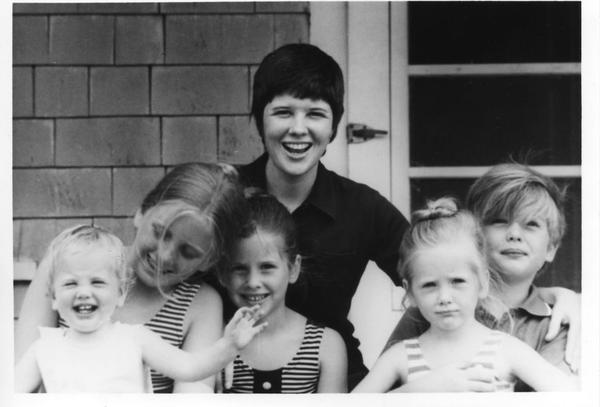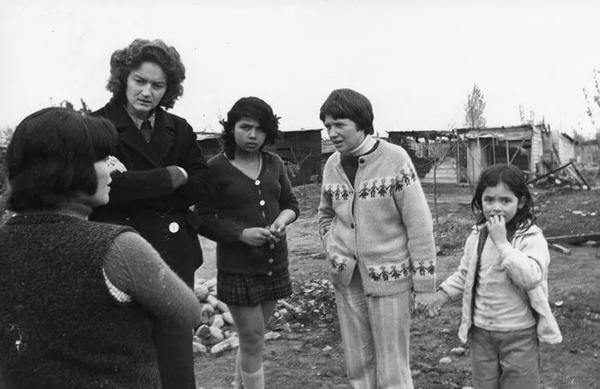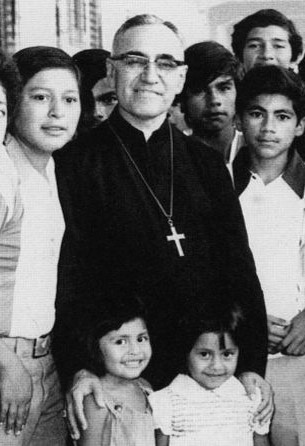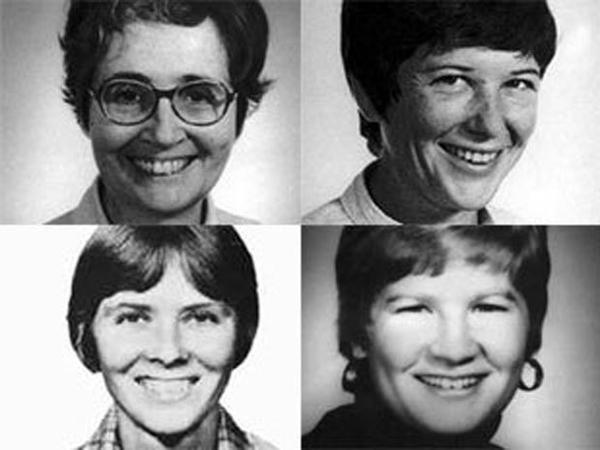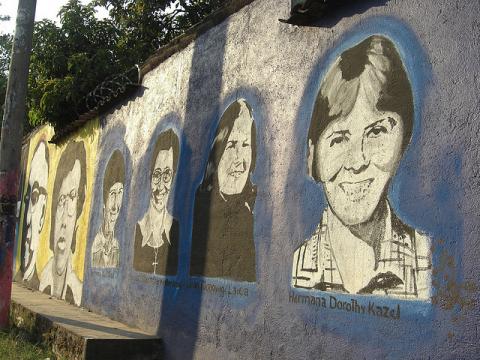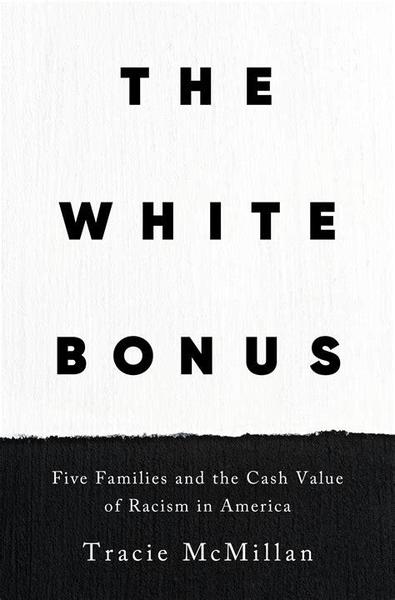December 6, 2024 Hello , It's forty-four years since four American missionaries died in El Salvador, but the women are remembered every December 2nd: as symbols of resistance and of brutal US foreign policy. El Salvadoran National Guard soldiers who raped and executed the three Roman Catholic nuns and one lay woman in 1980, had graduated from the US-run School of the Americas. In the following twelve years of civil war in El Salvador, we sent $4.5 billion dollars in direct military aid, including hardware and troop training, to the military regime that held the El Salvadoran people in a grip of terror. Maryknoll Sister Ita Ford could have lived safely in the US, but chose to make her home in a war-torn impoverished barrio,
her love so threatening they killed her.
American Tax Dollars Worked Against Her
From a young age Ita loved music. She'd sit at the kitchen table after school
and harmonize with her father who was retired from the insurance business. As a teenager on Saturday afternoons she would go on long bike rides with her friend Grace. In her college years she traveled across the US and into Mexico with her girlfriends in a cramped Volkswagen bug. After graduation, a trip to Russia and Poland left her inspired the faith of people who lived without the freedom to practice their religion. She decided she wanted to become a Maryknoll missionary. The Maryknoll Sisters see themselves as "the heart and hands of the U.S. Catholic Church’s overseas mission work serving the needs of the poor, the
ailing and the marginalized."
Sister Ita Ford with children. Image courtesy of the Maryknoll Sisters Friends described Ita as very pretty, but one who didn’t seem to care to make the most of her looks. She dressed in simple clothes which she wore over and over for years. She
considered marriage, dreamed of a large family and a quiet home in a rural area, but the more she considered marriage, the more persistent her older dream became. Ita entered formation with the Maryknoll Sisters in 1971, and the following year, in Bolivia learning Spanish, she had her first experience of military siege. Tanks rolled into the streets to confront two labor unions considering a strike. No meetings were permitted, no traveling and no more than three people together on the street at night. The military dictatorship in Bolivia killed or caused the disappearance of hundreds of citizens. “But life seems to go on,” Ita wrote to a friend.
Ita's next post, once she learned Spanish was Santiago, Chile. She arrived in time for the 1973 military coup and assassination of President Allende. The United States has been involved in the overthrow of the elected democratic socialist president and his coalition government. Amidst the oppression, Ita found a home with other sisters in barrio called La Bandera, where people lived in tents or shacks, squatting on vacant
property. Most had come from the countryside seeking a means of living. Few had more than a grade school education. Some found jobs as maids, construction workers and housekeepers, but couldn't earn enough for their families' basic needs.
Maryknoll Sisters Carla Piette, tallest, and Ita Ford, in
light-colored sweater, worked in Chile before going to El Salvador, where both died. Carla died when a flash flood overturned their jeep on the way to deliver food to refugees. Trapped below the steering wheel in the raging waters, Carla’s last act was to give Ita a shove that thrust her out through a narrow window. (Maryknoll Sisters Communications Dept.) Ita grew
to love the people of La Bandera over the next five years as General Augusto Pinochet's brutal dictatorship tightened its hold. During his 17-year rule, more than 3,000 people would be disappeared or killed and some 38,000 would become political prisoners, most victims of torture. When the time came for Ita to return to the US for a year of reflection before making her final vows to the Maryknoll order, she really didn't want to leave. She'd found her place living and working with the poor in Chile. Others could see she needed the break to restore her health. When Ita returned to Chili to make her final vows, El Salvador Archbishop Oscar Romero requested help from the Maryknoll Sisters. Ita was drawn his vision of Church as “accompanying” the people as they struggled to live fully human lives
under oppression. This is how Ita had come to see her work in Chile. In 1977, she wrote, "Am I willing to suffer with the people there,
the suffering of the powerless? Can I say to my neighbors, ‘I have no solution to this situation; I don’t know the answers, but I will walk with you, search with you, be with you.’?” She decided to answer the need in El Salvador in the spring of 1980. While on her way to there, she heard the stunning news that Archbishop Romero had been assassinated.
Archbishop Oscar Romero, El Salvador, c.1970s Romero had become the most well-know critic of the U.S.-backed military regime in El Salvador, which had the label "communist insurgents" ready to slap on members of labor unions, student protesters,
and Catholics whose faith cast poverty, injustice, and oppression as social sins. Every week Archbishop preached on Catholic radio to the largest audience of any program in
the country. He listed the disappearances, tortures and murders each Sunday. On March 23, 1980, Romero called on Salvadoran soldiers, as Christians, to obey God's higher order and stop carrying out the government's repression and violations of basic human rights. The following night, while saying Mass, Romero was shot to death. In choosing to go to El Salvador, Ita was fully aware of the violence, confusion and suffering she'd find, and yet at times it seemed incomprehensible. In one town she visited, twenty-five people had been massacred and security forces refused to let the bodies be buried. Families had to watch as
vultures ate the bodies of their loved ones.
“I don’t know if it is in spite of, or because of the horror, terror, evil, confusion, lawlessness," Ita wrote, "but I do know that it is right to be here…. It is a privilege to come to a church of martyrs and people with a strong committed faith.”
Later that year in November, Ita and Sister Maura Clarke traveled to Nicaragua for their Maryknoll regional assembly. Ita reported about the increasing hostility and persecution of those who continued to follow the course set by Archbishop Romero. The Assembly ended days later with a party where Ita jumped up and taught the other sisters the “Barnyard Shuffle” while they all sang “Old MacDonald had a Farm.” The next day she and Sister Maura Clarke boarded a plane for San Salvador. The National Guard had surveillance on two women headed to pick them up at the airport Ursuline Sister Dorothy Kazel, and lay missionary Jean Donovan. Acting on orders from higher-ups five National Guardsmen
changed out of uniform and staked out the airport. When the four women left the airport, their vehicle was stopped and they were driven to an isolated area. The soldiers beat, raped and murdered the women.
Clockwise from top left: Maura Clarke, Ita Ford, Jean Donovan, and Dorothy Kazel. Peasants living nearby heard machine gun fire followed by single shots and saw five men flee the scene in the white van. The next morning when they discovered the bodies, they were ordered by local authorities — a judge, three members of the National Guard, and two commanders — to bury them in a common grave
in a nearby field. When the women did not return as expected, fellow Maryknoll Sister Madeleine Dorsey and others went looking for them. "Two days of
searching later, a farmer told his parish priest that he had been forced to bury four unidentified white women," Sister Madeleine said. "We literally flew in a jeep to that remote area. Then came the painful exhumation. Jean came out first, her adorable face had been shattered. Dorothy had a calm expression. Maura's face seemed to emit a silent groan. Finally, there was little Ita. I reached over to wipe the dirt from her cheeks and place her arm near her side. We, the Sisters, fell to our knees
in reverence.” There with Sister Madeleine to observe the exhumation was another Maryknoll sister, 15 reporters and US Ambassador Edward White. Three of the five officers later found responsible for the rape and execution of these women, were graduates of the School of the Americas, run by the U.S. military. Four of them later convicted of the crime said they were following orders from their commander. A UN report concluded in 1993 that top military and political officials in the U.S.-backed regime had plotted to cover up the killings. Time has not faded the memories of the four women in Chalatenango, El Salvador, where their faces spread across a huge mural. Every December 2nd flowers are laid on the tombs of the two buried there, Ita and Maura.
Chalatenango, El Salvador. The lives and work of Ita Ford, Maura Clark, Jean Donovan and Dorthy Kazel are remembered in the US, too. They inspire Catholics and non-Catholics alike to condemn American imperialism and to recognize and challenge oppressive structures abroad and at home. Like my article today? Please forward this email to family and friends.
Gosh, the price of books has gone up like everything else! I just paid $42.00 for Afraid: Understanding the Purpose of Fear and Harnessing the Power of Anxiety by Arash Javanbakht, MD. My library has the e-book, but I'm using this book for research on a
new project (more on that coming soon). I bought it so I can underline and scribble. I haven't finished it, but so far, it's great. The author traces just how much of her family’s modest wealth can be attributed to discriminatory policies and practices over three generations.“For a very long time,” she writes, “I thought race and racism ‘happened’ only to people who were not white.”
Through investigative research, interviews and personal recollections, McMillan examines how racism has shaped her life, as well as the lives of four other White, middle class families. Kirkus Reviews calls it, "a
well-researched, disquieting examination of inequality."
Follow me on social media
This newsletter is a reader-supported publication. To support my work, consider becoming a paid subscriber.
Read
a great book? Have a burning question? Let me know. If you know someone who might enjoy my newsletter or books, please forward this e-mail. I will never spam you or sell your email address, you can unsubscribe anytime at the link below. To find out more about my books, how I help students, teachers, librarians and writers visit my website at www.MaryCronkFarrell.com. Contact me at MaryCronkFarrell@gmail.com. Click here to subscribe to this newsletter. |
|
|

